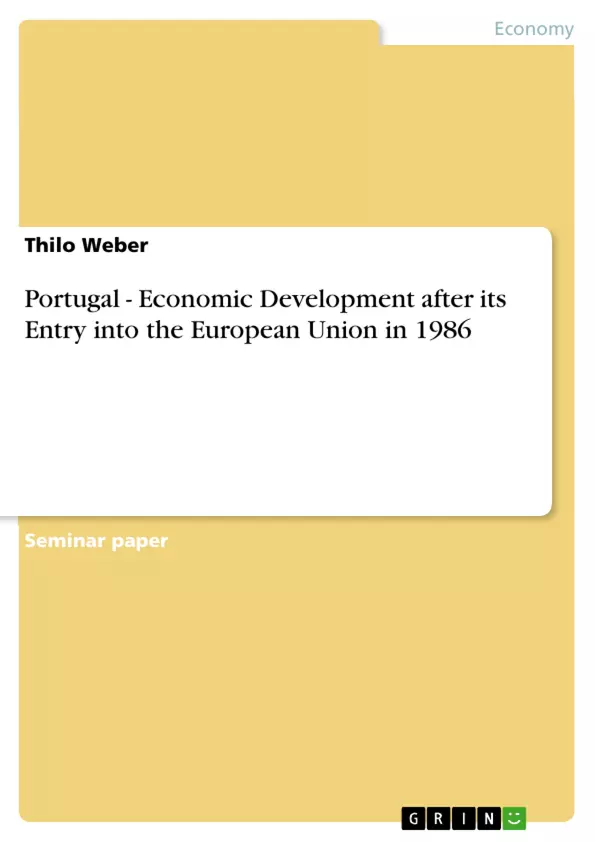[...] The revolution in 1974 was the beginning of dramatic political,
economical and social changes in the country. In 1986, when Portugal became a member of
the European Community (now European Union), the economy began to grow even faster
than it had been the case in the years before. “Portugal´s GDP per capita, which had been only
53 percent of the EU average in 1985, has now risen to more than 70% of the EU average by
1997.”1
As I was living in Portugal´s capital Lisbon from 1984 until 1989, I personally experienced
these great changes. I can remember that, e.g., chocolate was not known in Portugal until
1986. I also remember narrow roads which were in an extremely bad condition. Tramways
and busses made me feel like in the 19th century. Furthermore, there were a lot of huts,
particularly in the northern and in the eastern Lisbon periphery which I passed every morning
on my way to school. These huts, in which mostly people from the former Portuguese
colonies were living, disappeared between 1986 and 1990.
Also the infrastructure was getting better and better. Many new roads and motorways were
built, the tramway- and underground-system was modernised, big shopping- malls were built
and you could suddenly buy almost everything (Haribo-Gummibärchen were sold in Portugal
in 1986 for the first time and I guess I was the only one who bought them…)
Beside these positive changes I also recognised, that people have changed their behaviour
since the 1980´s. When I arrived to Portugal with my family in 1984 the Portuguese seemed
to be friendlier than any people I had met before and time did not seem to be important to
them at all. People were just living somehow, many of them were happy, some were not but
nobody really complained about the fact that Portugal was the poorest country in the western
part of the European continent. Of course, the Portuguese are still very friendly, but in my
opinion the difference between the busy and hectic Central Europeans and the Portuguese has
become smaller. It is also quiet obvious that today the Portuguese do everything they can to
improve the economic situation and the standard of living. Portugal wants to catch up. It
already has caught up enormously in the past 15 years and I am sure that this positive
development will continue in the future.
1Department of State,UnitedStatesofAmerica, Portugal 2000: Country Commercial Guide,
http://www.state.gov/www/about_state/business/com_guides/2000/europe/portugal00_02.html, 27/06/02
Table of Contents
- Introduction
- Short Presentation of the Country
- General Information
- Geography
- Chronology
- Summary of the Economic Situation under Salazar and the Time before the Entry into the European Union in 1986
- The Economic Development in Portugal after its Entry into the European Union
- Economic Growth
- Labour and Employment
- Infrastructure
- Conclusion
Objectives and Key Themes
This work aims to provide an overview of the economic development of Portugal following its entry into the European Union in 1986. It explores the changes that Portugal experienced during its transition from a relatively poor country to a more prosperous member of the EU.
- Economic growth and prosperity in Portugal following EU entry
- Improvements in infrastructure, labor market, and standard of living
- The impact of EU membership on Portugal's economic trajectory
- Comparison of Portugal's economic performance with the EU average
- The challenges and opportunities faced by Portugal in the context of European integration
Chapter Summaries
The introduction sets the scene by outlining Portugal's economic situation prior to its EU membership and highlighting the significant changes that occurred after 1986. It emphasizes the importance of understanding Portugal's economic transformation in the context of its historical background.
The second chapter presents a comprehensive overview of Portugal, covering its general information, geography, and history. This chapter serves as a foundation for understanding the economic context of the country.
The third chapter delves into the economic situation of Portugal under Salazar and the period leading up to its EU accession. This chapter provides a historical perspective on the economic challenges that Portugal faced before joining the EU.
Chapter four focuses on the economic development of Portugal after its entry into the European Union. This chapter examines key areas such as economic growth, labor market performance, and infrastructure development, providing insights into the impact of EU membership on Portugal's economic progress.
Keywords
The primary keywords and focus topics of this work include economic development, Portugal, European Union, EU membership, economic growth, infrastructure, labor market, standard of living, and comparative analysis of Portugal's economic performance within the EU.
- Arbeit zitieren
- Thilo Weber (Autor:in), 2002, Portugal - Economic Development after its Entry into the European Union in 1986, München, GRIN Verlag, https://www.hausarbeiten.de/document/20013


